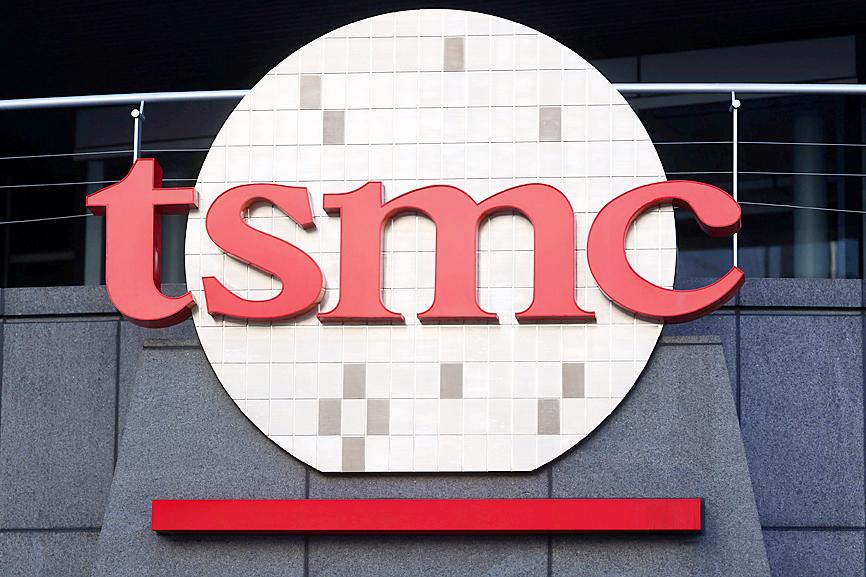Taiwan Semiconductor Manufacturing Co (TSMC, 台積電) shares tumbled 3.03 percent yesterday as investors worried about an Intel Corp plan to return to the foundry business.
The stock closed at NT$571 in Taipei trading, with turnover surging to 115.32 million shares, the most in about a month, after Intel chief executive officer Pat Gelsinger announced it would invest US$20 billion to build two new fabs in Arizona, as well as develop a new standalone foundry business to make chips for other companies.
At the same time, Intel would bolster its partnerships with third-party foundries to farm out more production, Intel said in a statement.

Photo: Ann Wang, Reuters
The move might create an awkward competitive-collaboration environment between the company and foundries.
The Santa Clara, California-based chipmaker is to offer intellectual property (IP) portfolios for customers, including for its own x86 cores, as well as Arm Ltd and RISC-V ecosystem IP, it said.
The announcement is a clear indication that “Intel is determined to come back to foundry business,” Cornucopia Capital Partner Ltd (聚芯資本) managing partner Eric Chen (陳慧明) said by telephone.
“This is certainly bad news for TSMC, but how bad it is depends on how Intel allocates its capacity and resources to fulfill its goal of becoming a world-class foundry,” Chen said.
All in all, it will require more than determination for Intel to become a real challenger to TSMC, the world’s biggest foundry service provider, he said.
“There is a long way to go,” Chen said, adding that TSMC has become a big foundry with significant capacity and IP investment.
“I doubt Apple Inc, Nvidia Corp or Advanced Micro Devices Inc will turn to Intel for chip supply, given unresolved lawsuits and direct competition,” he said.
Intel has lagged behind TSMC in advancing chip manufacturing technologies.
The US chipmaker yesterday said it is to enter the final design stage of 7-nanometer chips this year, while TSMC plans to start mass production of 3-nanometer chips next year.
“Intel is doing the right thing,” Chen said.
Its plan would allow the company to secure substantial subsides and resources from the US government, as Washington is pushing for products to be made in the US and reduce its dependence on TSMC for chip supply, he said.
In addition, Intel’s heavy investment in new fabs would attract suppliers of semiconductor components and materials to Arizona, making the state a major semiconductor manufacturing hub, like science parks in Taiwan, he said.
TSMC in 2023 plans to complete a new US$12 billion fab in Arizona to make 5-nanometer chips.

TAKING STOCK: A Taiwanese cookware firm in Vietnam urged customers to assess inventory or place orders early so shipments can reach the US while tariffs are paused Taiwanese businesses in Vietnam are exploring alternatives after the White House imposed a 46 percent import duty on Vietnamese goods, following US President Donald Trump’s announcement of “reciprocal” tariffs on the US’ trading partners. Lo Shih-liang (羅世良), chairman of Brico Industry Co (裕茂工業), a Taiwanese company that manufactures cast iron cookware and stove components in Vietnam, said that more than 40 percent of his business was tied to the US market, describing the constant US policy shifts as an emotional roller coaster. “I work during the day and stay up all night watching the news. I’ve been following US news until 3am

UNCERTAINTY: Innolux activated a stringent supply chain management mechanism, as it did during the COVID-19 pandemic, to ensure optimal inventory levels for customers Flat-panel display makers AUO Corp (友達) and Innolux Corp (群創) yesterday said that about 12 to 20 percent of their display business is at risk of potential US tariffs and that they would relocate production or shipment destinations to mitigate the levies’ effects. US tariffs would have a direct impact of US$200 million on AUO’s revenue, company chairman Paul Peng (彭雙浪) told reporters on the sidelines of the Touch Taiwan trade show in Taipei yesterday. That would make up about 12 percent of the company’s overall revenue. To cope with the tariff uncertainty, AUO plans to allocate its production to manufacturing facilities in

Six years ago, LVMH’s billionaire CEO Bernard Arnault and US President Donald Trump cut the blue ribbon on a factory in rural Texas that would make designer handbags for Louis Vuitton, one of the world’s best-known luxury brands. However, since the high-profile opening, the factory has faced a host of problems limiting production, 11 former Louis Vuitton employees said. The site has consistently ranked among the worst-performing for Louis Vuitton globally, “significantly” underperforming other facilities, said three former Louis Vuitton workers and a senior industry source, who cited internal rankings shared with staff. The plant’s problems — which have not

COLLABORATION: Given Taiwan’s key position in global supply chains, the US firm is discussing strategies with local partners and clients to deal with global uncertainties Advanced Micro Devices Inc (AMD) yesterday said it is meeting with local ecosystem partners, including Taiwan Semiconductor Manufacturing Co (TSMC, 台積電), to discuss strategies, including long-term manufacturing, to navigate uncertainties such as US tariffs, as Taiwan occupies an important position in global supply chains. AMD chief executive officer Lisa Su (蘇姿丰) told reporters that Taiwan is an important part of the chip designer’s ecosystem and she is discussing with partners and customers in Taiwan to forge strong collaborations on different areas during this critical period. AMD has just become the first artificial-intelligence (AI) server chip customer of TSMC to utilize its advanced